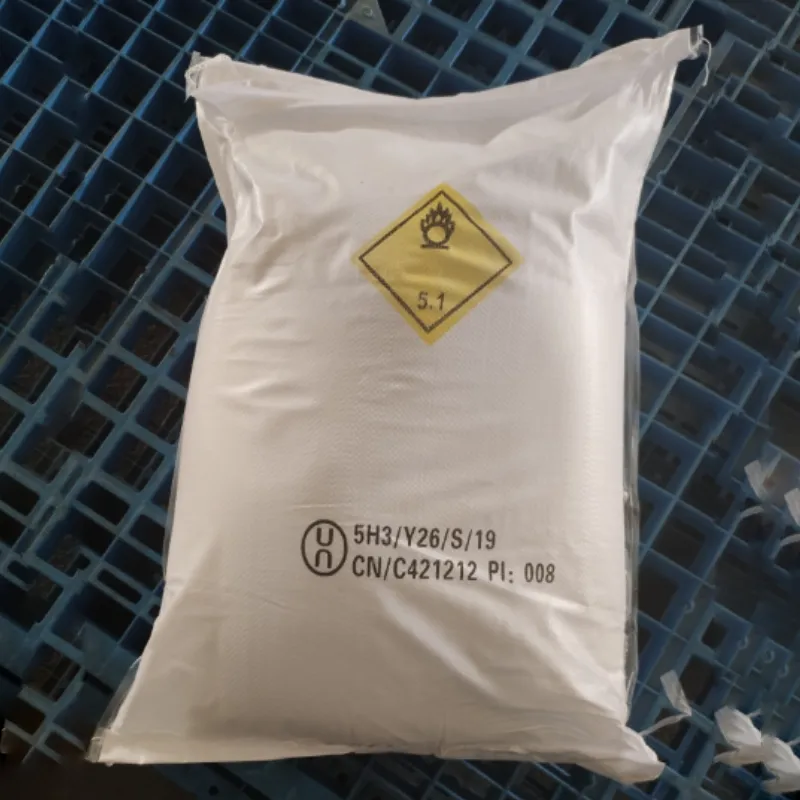
ammonium bicarbonate
Ammonium Bicarbonate An Overview
Ammonium bicarbonate, commonly referred to as ammonium hydrogen carbonate or carbamate, is a chemical compound with the formula NH4HCO3. It is an important compound in various industrial, agricultural, and food applications due to its unique properties and functionality.
Chemical Properties
Ammonium bicarbonate is a white crystalline solid that appears as a fine powder at room temperature. It decomposes upon heating, releasing ammonia gas and carbon dioxide. The thermal decomposition of ammonium bicarbonate can be represented by the following chemical equation
\[ 2 \text{NH}_4\text{HCO}_3 \rightarrow \text{(NH}_4)_2\text{CO}_3 + \text{CO}_2 + \text{H}_2\text{O} \]
This breakdown makes it critical to store the compound in cool, dry conditions to prevent premature decomposition.
Production
The primary method of production for ammonium bicarbonate is through the reaction of ammonia, carbon dioxide, and water. This reaction can occur in various processes, including
1. Direct synthesis This method involves combining ammonia (NH3) and carbon dioxide (CO2) under controlled conditions to form ammonium bicarbonate directly. 2. Recovering from other processes Ammonium bicarbonate can also be produced as a byproduct in the manufacture of urea from ammonia and carbon dioxide, which involves an intermediate reaction pathway that allows for the capture and conversion into bicarbonate.
The widespread use of this compound in agriculture and food industries underscores its significance in our society.
ammonium bicarbonate

Applications
1. Agriculture Ammonium bicarbonate serves as a nitrogen-rich fertilizer, synonymous with the establishment of healthier and more productive crops. It provides essential nutrients to plants, promoting growth and increasing yields. Its solubility in water allows it to be readily absorbed by plants when dissolved in irrigation.
2. Food Industry In the realm of food technology, ammonium bicarbonate is used as a leavening agent—especially in the production of baked goods like cookies and crackers. When heated, it releases carbon dioxide, facilitating the rise of the dough without the use of baking soda or yeast, thus providing a unique texture and flavor profile. It is also utilized in products that require a rapid leavening response, owing to its quick decomposition.
3. Chemical Industry Beyond its applications in agriculture and food, ammonium bicarbonate is valuable in various chemical syntheses, including the manufacture of certain plastics, pharmaceuticals, and agrochemicals. Its versatility allows chemists to use it as a pH buffer in various reactions or as a source of ammonia in syntheses.
4. Aging of Meat In some cultures, ammonium bicarbonate is utilized in the aging process of meat, helping to enhance the flavor and texture. However, care must be taken to use it in appropriate amounts to ensure safety upon consumption.
Safety and Environmental Considerations
While ammonium bicarbonate is generally recognized as safe for use when handled correctly, there are precautions to take. Inhalation of dust or exposure to skin may cause irritation. It is also crucial to ensure that ammonium bicarbonate does not contaminate water supplies, as excessive nitrogen from fertilizers can lead to eutrophication in aquatic environments. Good agricultural practices and scientific management are necessary to minimize environmental impacts.
Conclusion
Ammonium bicarbonate is a multifaceted compound that plays a vital role in modern agriculture, food technology, and industrial applications. As society continues to seek sustainable practices in food production and environmental stewardship, the significance of compounds like ammonium bicarbonate will undoubtedly increase. Its benefits, when utilized responsibly, demonstrate how chemistry can enhance agricultural practices, improve food quality, and contribute to the modern economy. Understanding its properties and applications enables us to appreciate its role in various sectors, paving the way for innovations in its use for future generations.
-
Understanding Synthetic Rubber OptionsNewsApr.27,2025
-
Trichloroisocyanuric Acid: Essential for Clean and Safe WaterNewsApr.27,2025
-
Sodium Dichloroisocyanurate: Key to Safe Water TreatmentNewsApr.27,2025
-
Sodium Acid Pyrophosphate: Essential in Modern Food ProcessingNewsApr.27,2025
-
Essential Water Treatment ChemicalsNewsApr.27,2025
-
Denatured Alcohol and Its Industrial UsesNewsApr.27,2025
-
The Versatile Uses of Sodium BicarbonateNewsApr.24,2025
Hebei Tenger Chemical Technology Co., Ltd. focuses on the chemical industry and is committed to the export service of chemical raw materials.
-

view more DiethanolisopropanolamineIn the ever-growing field of chemical solutions, diethanolisopropanolamine (DEIPA) stands out as a versatile and important compound. Due to its unique chemical structure and properties, DEIPA is of interest to various industries including construction, personal care, and agriculture. -

view more TriisopropanolamineTriisopropanolamine (TIPA) alkanol amine substance, is a kind of alcohol amine compound with amino and alcohol hydroxyl, and because of its molecules contains both amino and hydroxyl. -

view more Tetramethyl Thiuram DisulfideTetramethyl thiuram disulfide, also known as TMTD, is a white to light-yellow powder with a distinct sulfur-like odor. It is soluble in organic solvents such as benzene, acetone, and ethyl acetate, making it highly versatile for use in different formulations. TMTD is known for its excellent vulcanization acceleration properties, which makes it a key ingredient in the production of rubber products. Additionally, it acts as an effective fungicide and bactericide, making it valuable in agricultural applications. Its high purity and stability ensure consistent performance, making it a preferred choice for manufacturers across various industries.











